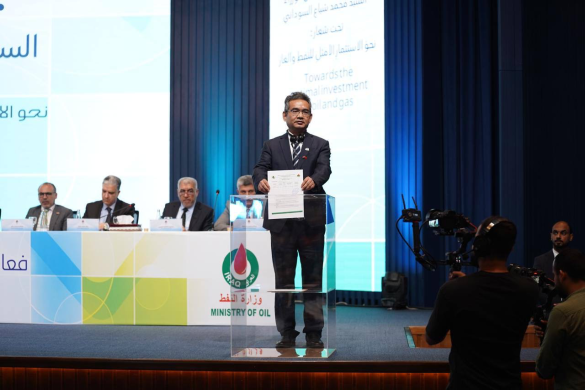The Iraqi government awarded exploration and development rights for five additional oil and gas fields to Chinese companies on Sunday, May 12, 2024. This brings the total number of licenses secured by Chinese firms to ten since the bidding process began the previous day. A solitary Iraqi Kurdish company, KAR Group, also secured bids for two separate fields.
Focus on Domestic Gas Production
The Iraqi government designed this sixth licensing round specifically to increase domestic natural gas production. Natural gas is a critical fuel source for power generation, and Iraq currently relies heavily on imports from neighboring Iran to meet its energy needs. However, a key aspect of the bidding round appears to have fallen short. There were no bids submitted for at least six of the fields identified as having gas potential, potentially undermining the initiative’s goal of bolstering domestic gas supplies.
Another noteworthy aspect of the story is the conspicuous absence of major American oil companies in the bidding process. Last month, Iraqi Prime Minister Mohammed Shia met with representatives from US firms during an official visit to the United States. Despite this diplomatic effort, no US companies have secured any contracts in the current round.
Analysts attribute this development to a confluence of factors. Major oil companies often view Iraq’s contract terms as less favorable compared to offerings in other regions. The country also continues to grapple with recurring military conflicts, which creates an element of instability for potential investors. Furthermore, the growing focus on environmental, social, and governance (ESG) criteria by investors may be discouraging some Western companies from participating in Iraqi oil exploration projects.
China Steps Up
China, on the other hand, appears to be capitalizing on the situation. Chinese companies, including CNOOC Iraq, ZhenHua, Anton Oilfield Services, Sinopec, and Geo-Jade, have been awarded licenses for exploring and developing oilfields in several Iraqi provinces. This strategic move strengthens China’s position in the global energy market and secures a vital source of oil for its growing economy.
Iraq, the second-largest oil producer within the Organization of the Petroleum Exporting Countries (OPEC), faces ongoing challenges in developing its oil sector. The unfavorable contract terms, security concerns, and the global shift towards renewable energy sources all pose significant hurdles. The dominance of Chinese companies in the current licensing round highlights this complex situation and raises questions about the future direction of Iraq’s oil and gas industry.
Uncertainties and the Need for Diversification
The conspicuous absence of major Western players, particularly American firms, is a cause for concern for the Iraqi government. While China’s involvement provides a much-needed source of investment, it also creates a situation of over-reliance on a single major player. A more diversified portfolio of partners could offer Iraq greater leverage in negotiating future contracts and ensure a more stable flow of investment for the industry.
The Iraqi government will need to address the concerns of Western oil companies regarding contract terms and security if it wants to attract a broader range of investors. Additionally, with the global energy sector transitioning towards renewable sources, Iraq may need to consider long-term strategies to diversify its own energy mix and prepare for a future where oil may not be as dominant.
Source: Reuters



